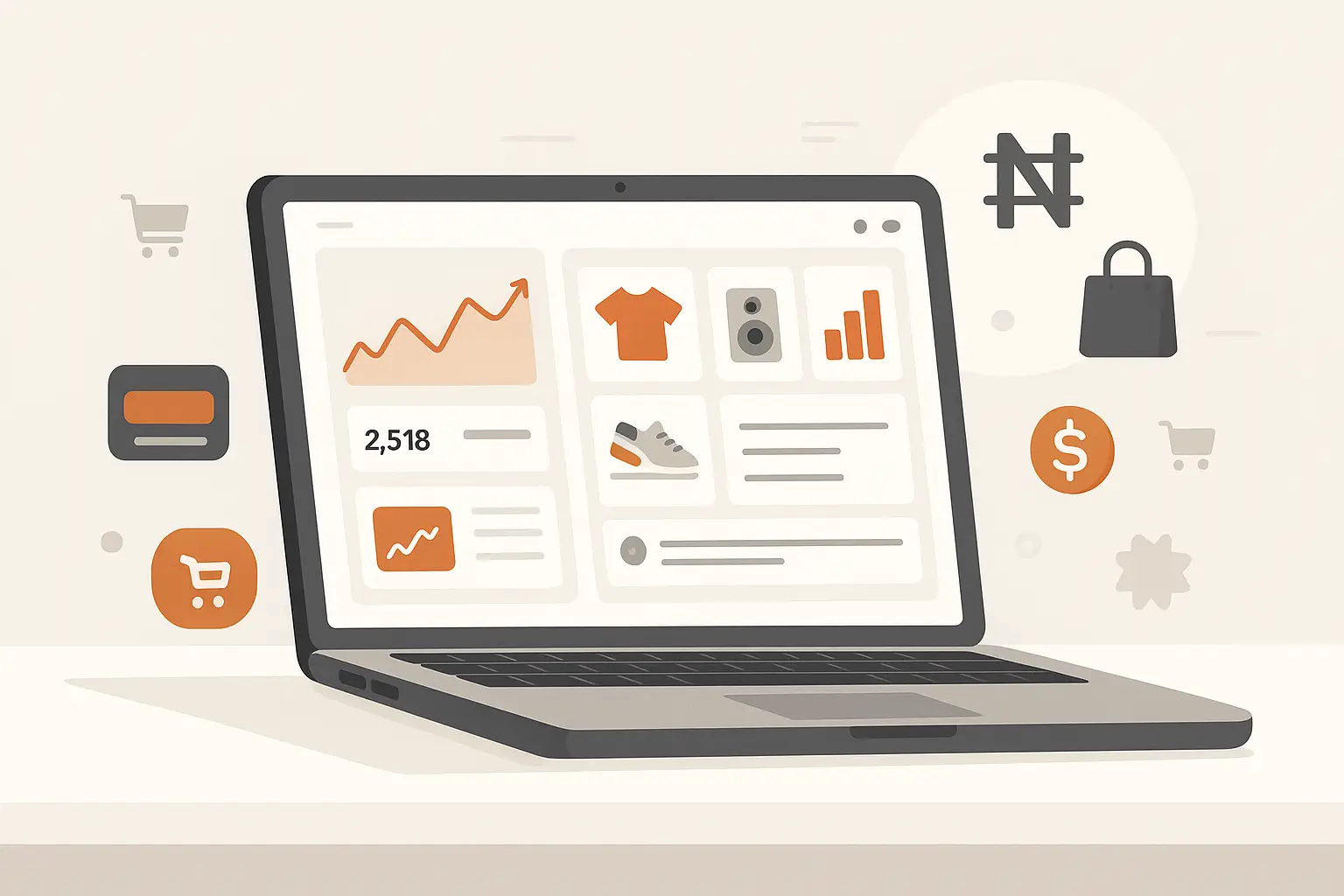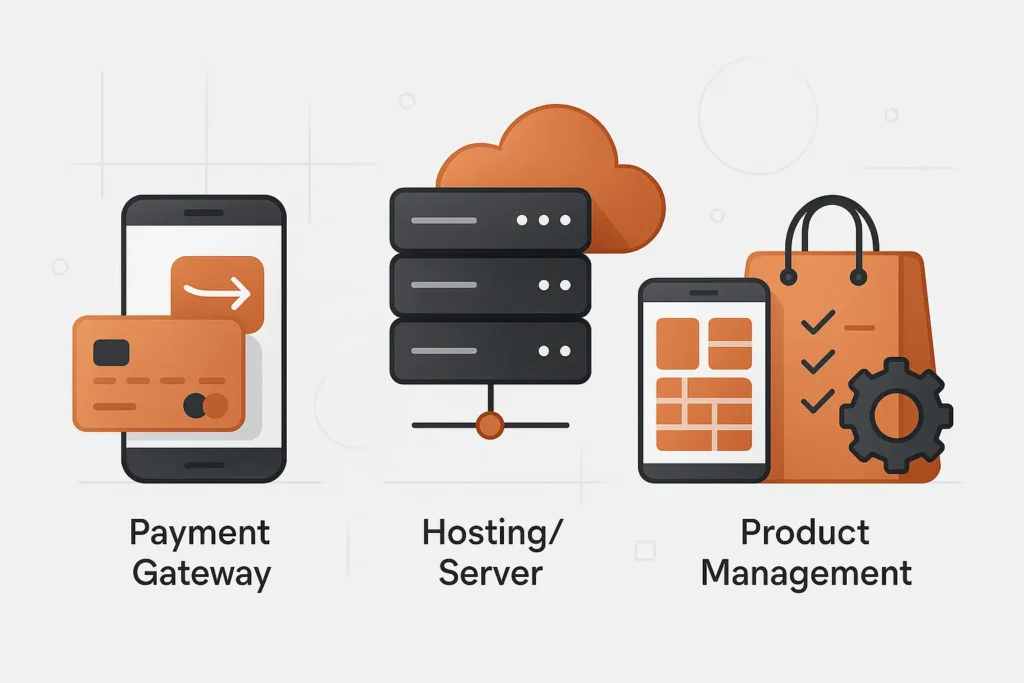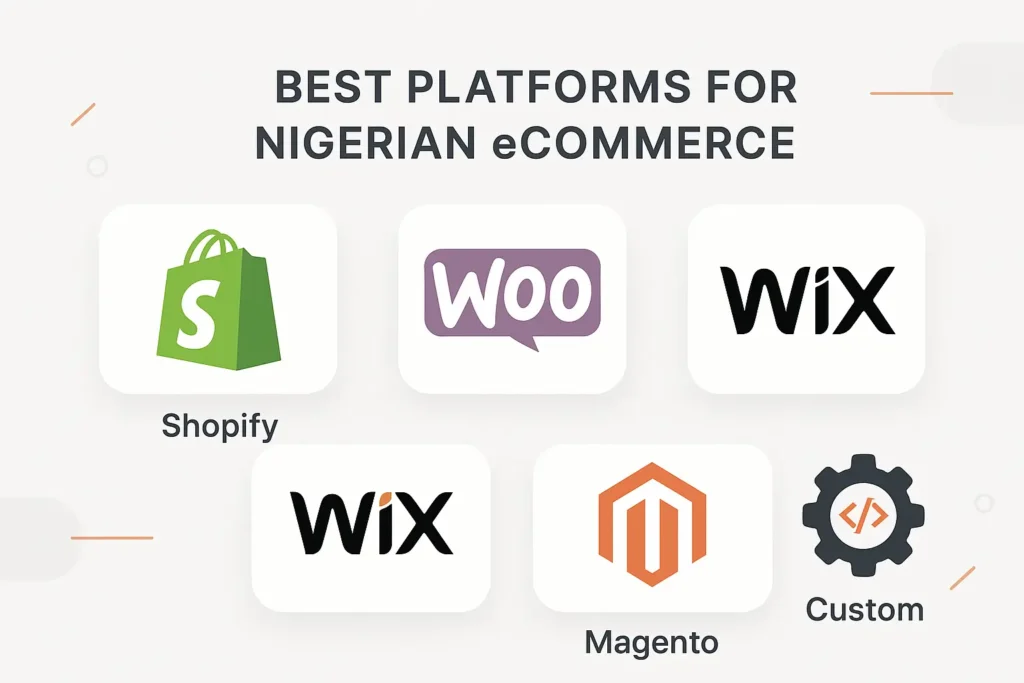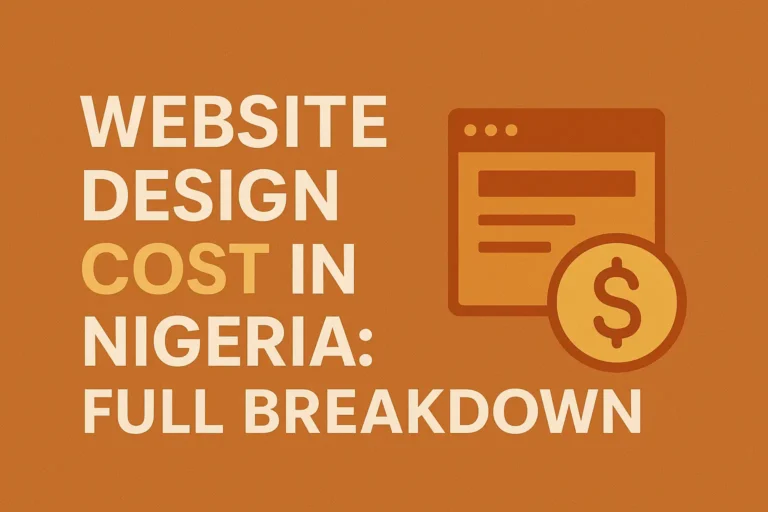How Much Does an eCommerce Website Cost in Nigeria? in 2026

The answer isn’t simple. Costs range from around ₦450,000 for a basic site to over ₦10 million for enterprise solutions. But numbers alone don’t tell the full story.
If you’ve been considering getting an e-commerce website for your business or you need one to start yours, this article will break down everything you need to know about the cost of an ecommerce website in Nigeria.
- Quick Cost Summary for Ecommerce Websites in Nigeria (2026)
- Key Factors Affecting Ecommerce Website Cost in Nigeria (2026)
- Hidden Ecommerce Website Costs to Consider:
- Full Cost Breakdown for Ecommerce Websites in Nigeria – 2026
- Cost-Saving Strategies Without Compromising Quality
- What E-commerce Platform Should You Choose?
- FAQs About Ecommerce Website Costs in Nigeria
- How much should I pay for an eCommerce website?
- What is the average cost of e-commerce website?
- How much to host an ecommerce website?
- Which platform is best for an ecommerce website?
- Conclusion: Make the Right Investment
Quick Cost Summary for Ecommerce Websites in Nigeria (2026)
Before we dive deeper, here’s a quick summary of the cost of an e-commerce website:
| Project Type | Estimated Cost (₦) |
|---|---|
| Small Business | ₦450,000 – ₦800,000 |
| Medium Business | ₦1.5 million – ₦3 million |
| Enterprise | ₦7 million – ₦15 million+ |
Key Factors Affecting Ecommerce Website Cost in Nigeria (2026)

1. Development Approach
Your chosen development method largely determines your ecommerce website cost.
- DIY Website Builders (₦50,000 – ₦500,000 ANNUALLY)
Platforms like Shopify, Wix, and Bumpa.
Best for small businesses and startups launching quickly on a budget. - Hybrid Approach (₦500,000 – ₦1 million)
Combines prebuilt platforms with customisations to improve functionality.
Ideal for growing businesses needing more features without full custom builds. - Custom Development (₦1 million – ₦10 million+)
Fully tailored solutions built from scratch. Development takes 2-6 months.
Suited for medium to large businesses with complex needs and high scalability goals.
Takeaway:
Choose an approach that matches your budget, timeline, and business goals. Avoid overspending on features you don’t need.
2. Essential Features
Feature requirements are a major factor in your ecommerce website cost in Nigeria.
- Basic Features (₦150,000 – ₦700,000)
Includes: product catalog, shopping cart, basic payment integration, simple checkout, and mobile responsiveness.
✅ Suitable for small businesses selling limited products with straightforward needs. - Standard Features (₦700,000 – ₦1 million)
Adds: multiple payment gateways, inventory management, order tracking, search functionality, basic SEO, and simple reporting.
✅ Ideal for growing businesses that want to streamline operations and improve user experience. - Advanced Enterprise Features (₦1 million – ₦3 million+)
Includes: multi-currency support, advanced analytics, AI-powered recommendations, custom ERP integrations, automated marketing, and omnichannel capabilities.
✅ Best for large businesses or marketplaces requiring high performance and scalability.
Takeaway:
Invest in features that directly impact your sales and operations, avoid overloading with features you don’t need (yet).
3. Hosting and Domain Costs
Don’t forget website hosting and domain costs when budgeting for your e-commerce website in Nigeria.
- QUALITY Shared Hosting (∼ ₦150,000 annually)
Low cost, limited bandwidth, and speed.
✅ Suitable only for very small businesses with minimal traffic. - VPS/Cloud Hosting (₦150,000 – ₦1 million annually)
More reliability, scalability, and better performance.
✅ Recommended for most growing ecommerce businesses. - Dedicated Hosting (₦1 million + annually)
Maximum performance, security, and resources.
✅ Best for large businesses expecting high traffic volumes.
Domain Registration:
₦8,000 – ₦50,000 annually depending on domain type and premium status.
Takeaway:
Choose hosting that matches your expected traffic. Poor hosting can cost you sales due to slow site speeds.
4. Payment Gateway Integration
- Paystack or Flutterwave Integration (1.5 – 2% respectively)
Standard for card and transfer payments in Nigeria.
5. Design Quality
Website design directly affects user trust and sales performance.
- Template Design (Free – ₦100,000)
Uses prebuilt themes with limited customisation.
✅ Cheapest option but less brand differentiation. - Custom Design (₦500,000 – ₦1 million)
Unique design tailored to your brand and customers.
✅ Best for businesses building a strong, professional brand identity. - Premium UX Design (₦1 million +)
High-end user journeys, advanced interface design, and conversion-focused layouts.
✅ Ideal for large businesses prioritising user experience and high conversions.
Takeaway:
If budget is tight, start with a quality template but plan to upgrade to custom or premium UX as you grow.
Let’s examine some typical scenarios to better understand the cost of an e-commerce in Nigeria in 2026:
Scenario 1: Startup Fashion Boutique
A startup fashion boutique might opt for WooCommerce with a premium theme, featuring a basic product catalog of 50-100 products, Paystack integration, and shared hosting.
This approach will cost between ₦450,000 – ₦750,000 initially, with annual maintenance running ₦150,000 – ₦250,000. This setup allows fashion entrepreneurs to showcase their products effectively while keeping initial investments manageable.
Scenario 2: Growing Electronics Store
A growing electronics store would likely need a WooCommerce or a custom Shopify store with advanced inventory management to handle diverse products with varying specifications.
With multiple payment gateways, VPS hosting, and SEO optimization, initial costs typically range from ₦1.5 million – ₦3 million, with annual maintenance between ₦500,000 – ₦1 million. This investment supports higher traffic volumes and more complex product management needs.
Scenario 3: Enterprise Marketplace
An enterprise marketplace requires substantial investment in a fully custom development with vendor management systems, advanced analytics, multiple integrations, dedicated hosting, and advanced security features.
These sophisticated platforms typically cost ₦7 million – ₦15 million initially, with annual maintenance ranging from ₦2 million – ₦5 million.
Hidden Ecommerce Website Costs to Consider:
When budgeting for an ecommerce website Nigeria project, several often-overlooked costs should factor into your planning:
Content creation represents a significant investment, with product photography (₦50,000 – ₦500,000), product descriptions (₦100,000 – ₦1 million), and brand storytelling (₦200,000 – ₦800,000) all requiring professional attention for optimal results. Legal requirements, including Terms & Conditions, Privacy Policy development, and NDPR Compliance typically cost between ₦100,000 – ₦500,000 total but are essential for protecting your business.
Marketing and SEO consultation, including ongoing SEO optimization, PPC campaigns, and social media integration, often demand the largest ongoing budget, while regular maintenance ensures your platform remains secure and competitive.
Full Cost Breakdown for Ecommerce Websites in Nigeria – 2026
| Cost Category | Basic (₦) | Standard (₦) | Advanced (₦) | Best for |
|---|---|---|---|---|
| Website Development | 150,000 – 500,000 | 500,000 – 3,000,000 | 3,000,000 – 10,000,000+ | Templates or DIY, custom builds for brands, enterprise-level |
| Annual Hosting | 150,000 | 150,000 – 350,000 | 800,000 + | Shared (small sites), VPS (growing sites), dedicated (high traffic) |
| Domain Registration | 9,000 – 50,000 | 9,000 – 50,000 | 9,000 – 50,000 + | Basic .com.ng, popular .com, premium keyword-rich |
| SSL Certificate | Free – 20,000 | Free – 20,000 | Free – 20,000 | Small sites, business sites, enterprise security |
| Payment Gateway Setup | 1.5 – 2% | 1.5 – 2% | 1.5 – 2% | Paystack and Flutterwave gateways |
| Content Creation | Not necessary | 200,000 – 1,000,000 | 1,000,000 + | Basic photos/descriptions, brand storytelling strategy |
| Legal Documentation | Not necessary | 150,000 – 300,000 | 300,000 – 500,000 | Simple policies, legal-reviewed, etc |
| SEO Setup | 100,000 – 200,000 | 200,000 – 500,000 | 500,000 – 1,000,000 | On-page only, technical & content, plus backlink strategy |
| Security Features | Free – 100,000 | Free – 300,000 | 300,000 – 1,000,000 | Plugins/basic monitoring, firewalls, full security suites |
| Annual Maintenance | 100,000 – 200,000 | 300,000 – 1,000,000 | 1,000,000 – 5,000,000 | Minimal updates, regular backups, full management & support |
💡 Summary Tip:
- Basic setups work for small startups launching fast.
- Standard tiers suit growing brands needing reliability and better UX.
- Advanced investments are for enterprises requiring scalable, secure, fully custom ecommerce solutions.
Cost-Saving Strategies Without Compromising Quality
Want to optimize your ecommerce website cost without cutting corners? Consider these strategic approaches:
Starting with an MVP (Minimum Viable Product) allows you to launch essential features first and add more as your business grows, spreading costs over time while generating revenue. SaaS solutions like Shopify offer excellent value for smaller businesses with predictable monthly costs.
Phased implementation splits your project into manageable segments, while open-source solutions and local development teams often provide excellent value compared to international agencies.
What E-commerce Platform Should You Choose?

Picking the right platform affects your website cost and growth potential:
- WooCommerce – The best solution. Uses WordPress and gives full control with lower upfront costs.
- Shopify – All-in-one, easy to manage, with strong security and Nigerian payment integrations.
- Wix – Best for small businesses wanting a quick, simple setup without technical skills
- Custom Development – Ideal for large businesses needing unique features, complex integrations, or full marketplace systems, but it’s more expensive and time-consuming.
- Magento – Suitable for mid-large businesses that need advanced functionality and can handle higher development complexity.
Choose based on your budget, technical skills, and long-term goals. For most startups and SMEs, Shopify, WooCommerce, or Wix will cover all essentials to launch and grow smoothly.
FAQs About Ecommerce Website Costs in Nigeria
How much should I pay for an eCommerce website?
In Nigeria, expect to pay ₦450,000–₦3 million in 2025, depending on features. Small businesses can start with ₦450k–₦700k using Shopify or WooCommerce. Custom solutions for mid-sized businesses range ₦1.5–₦3 million. Enterprise sites often exceed ₦7 million. Always align spend with your business goals and critical features like site speed and security.
What is the average cost of e-commerce website?
The average cost of an ecommerce website in Nigeria in 2025 sits around ₦1.5 million for a standard ecommerce website with custom design, payment integration, inventory management, and mobile responsiveness. Costs vary based on specific needs.
How much to host an ecommerce website?
Hosting costs for ecommerce websites ranges from ₦20k (shared) to ₦1 million (VPS/cloud) or ₦5 million (dedicated). VPS suits most SMEs. Additional costs for SSL, CDN, backups, and security can add ₦195k–₦1.3 million per year.
Which platform is best for an ecommerce website?
In 2025, the best ecommerce platforms for Nigerian businesses depend largely on business size and specific needs. For small businesses, Basic Shopify, WooCommerce, and Wix are popular. Medium businesses prefer Shopify Grow, WooCommerce, Magento Open Source. Enterprises often choose Magento Commerce, Shopify Plus, or custom builds. The best choice depends on your size, goals, and technical capacity.
Conclusion: Make the Right Investment
The cheapest option isn’t always the smartest. Focus on building a solid ecommerce foundation that supports your long-term goals. Start with what your business truly needs today and upgrade as you grow.
If you need expert guidance on building a high-performing ecommerce website that fits your budget and drives real sales, let’s talk. Contact us today to get started with your e-commerce website project.



